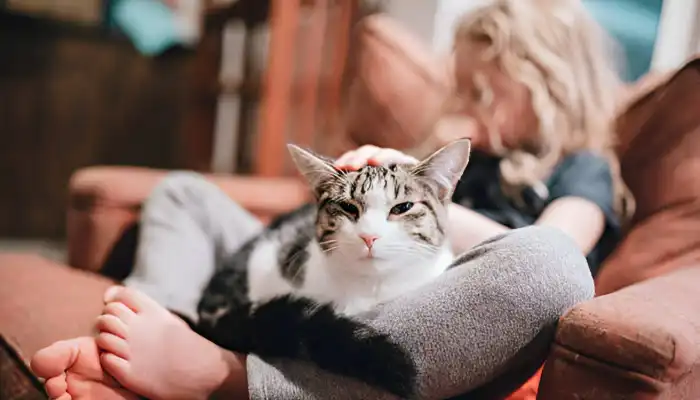How do cats say “good bye”? If you have ever wondered whether your cat noticed your exit while leaving home, you are not alone. Cats have ways of expressing their feelings, including goodbyes, and it certainly is not overt.
Different cats employ distinct body language, vocal sounds, and behaviors. Some cats are completely indifferent to your departure while others may appear overly attached or anxious, illustrating their varying temperaments. Cat translators can assist you to learn how cats express separation distress, which will enable you to enhance your relationship with the cat.

Do Cats Have Their Way of Saying Goodbye?
A bond differs from cat to owner, which in turn dictates how do cats say “good bye”. This means that the various elements of body language, vocal sounds, and behavioral patterns help us understand how cats say ‘goodbye’ in their way.
1. Body Language That Says Goodbye
The body position, tail action, and facial expressions of a cat can indicate how it feels about your leaving. The following are some of the familiar signs:
- Movements of the Tail: Waves of the tail means pleasure. Frustration can be depicted by tail flicking or swishing.
- Slow Blinks: If your cat makes eye contact and sleeps before you leave, it shows affection and trust.
- Fur and Hair On Their Ears And Whiskers: Relaxed fur and whiskers might mean calm whereas pulling ears back might show fear or anger.
- Hiding or Ignoring You: Some cats that do not require much attention may vanish or act indifferent when you leave.
Quick Tip: When your cat’s tail is raised with a friendly wave, it means they’re saying goodbye to you in a happy manner.
2. Common Sounds Cats Make When Saying Goodbye
How do cats say “good bye”? While some cats are silent, others use meows, purrs, or chirps to express their emotions when their owner leaves. Here are some vocal signs your cat might use:
| Sound | Meaning |
|---|---|
| Soft Meows | A gentle farewell, sometimes seeking reassurance. |
| Loud Meows | Protest or demand for attention before you go. |
| Chirps or Trills | A friendly acknowledgment of your departure. |
| Purring | A sign of relaxation or an attempt to comfort themselves. |
| Silent Treatment | Some cats refuse to make a sound, acting distant. |
Listen closely! How do cats say “good bye”? A cat’s meow before you leave might mean “See you later” or “Don’t go!”
Do Cats Know When You’re Leaving?
Cats are remarkably watchful animals and can notice subtle departures, such as when you’re attempting to step out. How do cats say “good bye”? They often do this by associating their owner’s movements with familiar cues and patterns that are already set.
Do Cats Miss You More if You’re Gone Longer?
- Leaving for a couple of hours: Most cats will turn on the television, engage in self grooming, or sit by the window and watch birds.
- Leaving for a full day: Others may not do much but sit at the door or be vocal when you return.
- Leaving for several days: In this scenario, the owner might anticipate the cat shifting the furniture to a new location. Excessive grooming is another sign of feline anxiety that should not be dismissed just because the cat gets bored.
Cats are not the same, so don’t assume every single cat will behave similarly. Some may not miss you at all while others may crave a decent amount of attention.
Tips to Keep Your Cat Relaxed When You’re Away
It’s possible to lower anxiety and make separations smoother when leaving your cat alone. If your cat shows anxious or stressful signs near the time you are leaving, consider these steps.
1. Use a Specific Phrase to Establish a Routine Goodbye
- Use a stepwise and consistent phrase throughout the period leading to the separation (example: “See you soon!” )
- Give them a treat or a special toy beforehand.
- Steer clear of high volume departures to avoid increasing stress levels.
2. Use Scent To Calm Your Feline Friend
- Set aside an unworn shirt or blanket that has your scent on it.
- Use pheromone diffusers to put them in a calming space.
- Make sure that there are safe hiding places should they feel anxious.
3. Leaving Without Notice:
- A subset of cats are capable of leaving the house without any need to say farewell, and for others, it is better to bid adieu.
- Try both and see what your kitty prefers.
In the event your kitty hides the moment you’re walking out, they may be feeling anxious. Try to adopt a more soothing system to help them out.
Do Cats Miss Their Owners?
How do cats say “good bye”? Cats are known to be lone creatures, but they create healthy relationships with their owners too. Research indicates that certain breeds of cats experience separation stress and show tendencies like:
- Doubling their meowing or yowling when left alone.
- Not eating at all or refusing food when the owner is out.
- Grooming excessively or the cat’s self-inflicted stress.
- Sitting by the doorstep waiting for the owners to come home.
Though rarely done, some cats thrive in being alone and like to remain in seclusion. Upon your arrival, you might find your furry friend doing any of the following things:
- Interacting with your legs.
- Purring with a distinct volume or repeatedly patting.
- Walking after you in the house.
How do cats say “good bye”? Not all cats behave the same! Some are very fond of their owners and may show signs of missing them, while others enjoy their personal space and seem unaffected when you leave.
Conclusion
How do cats say “good bye”? Felines utilize a combination of words, body movements, and actions to convey how they feel. Some cats blink slowly, meow softly, or rub against you, while others may choose to completely ignore you.
Ensuring that these pets transition smoothly when you leave entails the establishment of a recall set, a goodbye statement, a scent comforter, and engaging toys.” How do you think cats say goodbye to their humans? Do let us know in the comment section!
